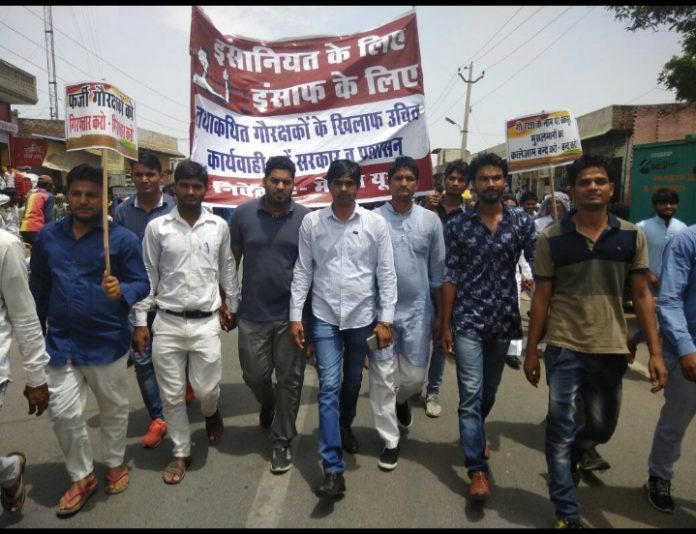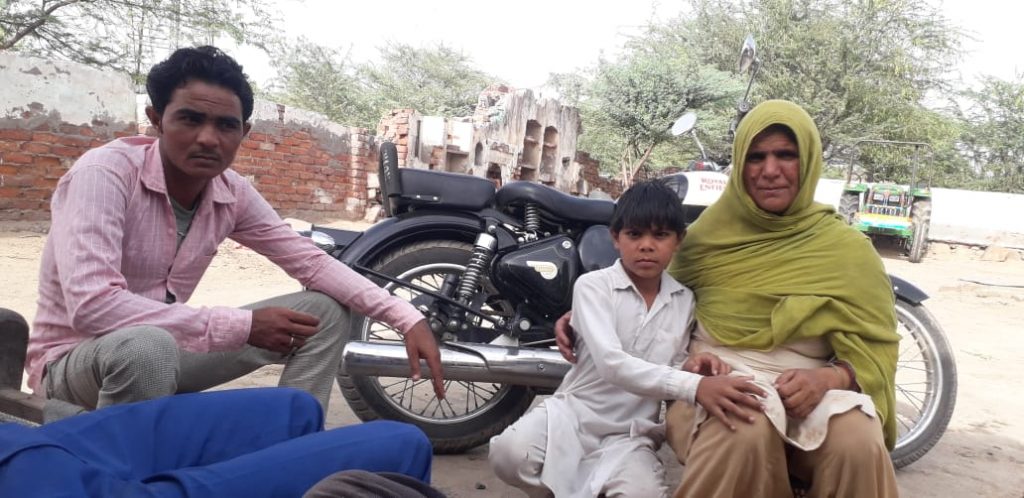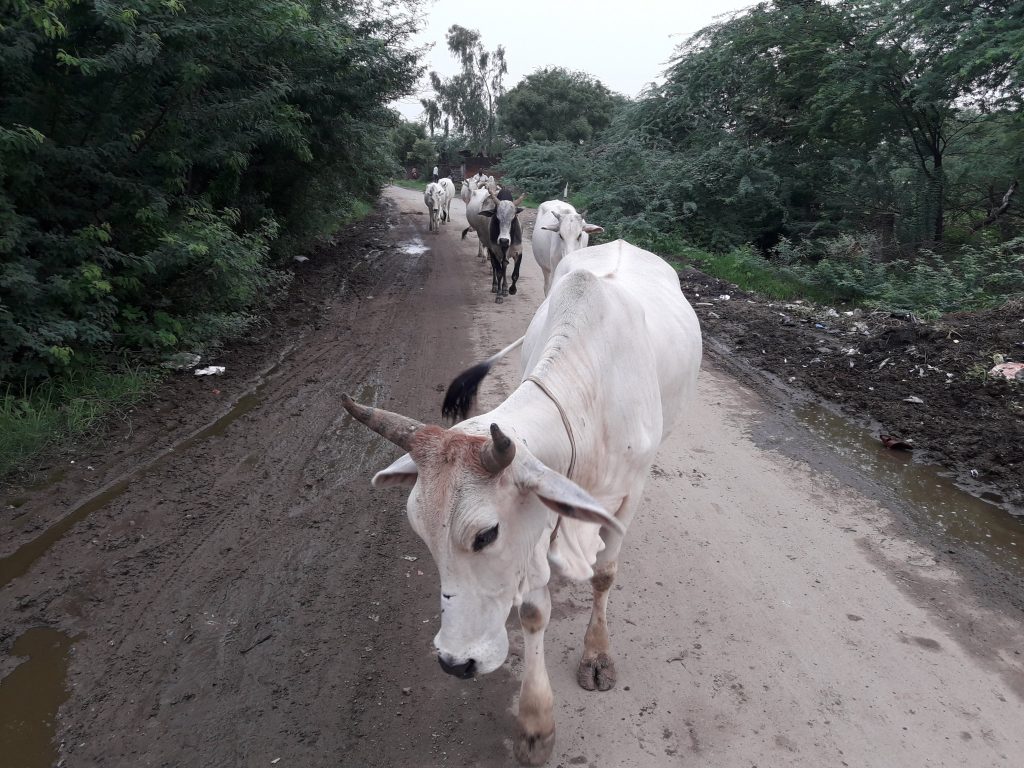“I don’t even bring mutton home now, for fear of it being mistaken for beef,” says Moeen Khan, 35 years, grandson of former Member of Parliament from Faridabad constituency Rahim Khan who belongs to the Meo community and lives in Haryana’s Palwal city bordering the Nuh district of the state.

Mewati youths protest against cow-vigilantism
Meos are a community of Muslims who reside in the Mewat region comprising Haryana’s Nuh district ; some parts of Faridabad; Rajasthan’s Alwar and Bharatpur districts, and one administrative division of Uttar Pradesh’s Mathura district.
Meos are concentrated in Nuh and around 80% of the district’s one million people belong to the community.
The region came to public attention in 2017 when a dairy farmer of Nuh’s Jaisinghpur village, Pehlu Khan, 55, was lynched by a mob of cow-vigilantes in neighboring Rajasthan’s Behror city. Following the incident, two more men from the region lost their lives in separate incidents of mob violence while many more received injuries.![]()
Meos have traditionally been cattle-breeders and some villagers profess to having more than 50 cows with them a few years ago.
“The topography of the area with hillocks and grazing land in the foothills, allow villagers to keep cattle in large numbers,” says Ramzan Chaudhary, president of the All India Mewati Samaj, an organization of Meos around the country.
Meos trace their history to seventh century and claim themselves to be the descendant of Hindu Rajput rulers of the region.
“Despite being Muslim, lots of our cultural mores are similar to those of Hindus like the belief in gotras, castes, etc. Until few decades ago we used to celebrate all the major Hindu festivals also,” says Saleem Khan, a social activist from Mudhee village of the district.

Mob-lynching victim Pehlu Khan’s son Irshad at his house with his younger brother and mother in Jaisinghpur village, Nuh
Claiming to have a “special” and “emotional” relationship with cows, some Meos say that they would not kill it for food however acknowledge at the same time that some members of the community do it.
“Ever since the matter has taken a communal tone, village panchayats and religious leaders (maulvis) have declared a ban on eating beef. We have even warned the panchayat heads that they would be punished if a resident of their village was found selling or eating beef,” says Chaudhary.
Plagued with poor infrastructure, lack of water and high rate of illiteracy, Nuh came in at the bottom of a list of 101 most backward districts of the country released by the Indian government’s policy think tank, Niti Ayog last year.
The attacks have increased the problems of the region by creating a fear psychosis among the people resulting in their reluctance to buy cows. This has hit the dairy-business of the region hard.
“People are scared to bring cows now. Since buffaloes are very expensive, very few could afford them which have adversely affected the profit margin,” says Mohammad Qayyum, a dairy-owner in Jaisinghpur village.
Reselling of old and unproductive cows have also become difficult as the stringent implementation of Haryana Gauvansh Sanrakshan and Gausamvardhan Act, 2015, which prohibits cow slaughter, consumption, sale and storage of beef, has made cows pariah among villagers.
Pehlu Khan’s eldest son Irshad,28 years, who is also one of the victims of the assault, says that he had to search for another source of income after the incident as keeping cows became unfeasible for Muslims. A father of three, Irshad co-drives a truck now, and remains out of town for months. Because of the continuing case in an Alwar court however he has to cancel his trip frequently causing him monetary losses.
Nuh is surrounded by Hindu-majority regions of Haryana and Rajasthan. With the arrival of BJP in Centre, the residents of the district say that a concerted effort has been made to “isolate” and “attack” the practices and way of life of the Meos.
“If a Meo Muslim has to bring a cow for milk, he has to come through the neighboring districts where the right-wing groups spot them and launch attacks,” says Saleem Khan.
Azad Khan, a farmer leader of the region says that Muslim farmers are scared to even take their cows for mating with bulls (a practice in villages) few kilometers from their houses for fear of being seen as moving them for slaughter.
“Cow’s rope in the hands of a Muslim is enough for some people to accuse him of cow-smuggling,” says Khan.
Moeen Khan acknowledges that despite the increased scrutiny around cows some cattle-thieves might still be operative in the area who would pick stray cattle, mostly.
He however further adds that members of Hindu communities are also involved in this act as they are the ones who inform the criminals about the location of the cattle in lieu of money.
“A minuscule number of people, belonging to both the communities, are involved in this act. They are criminals and should be treated just like that only. Identifying them with their religion would be wrong,” says Khan.
He adds that the role of police is crucial in the illegal business of cow-smuggling.
“Without the involvement and approval of police personnel it’s next to impossible to transport cows illegally,” Khan claims.
Chaudhary, who is also a lawyer, says in a district with poverty and rampant unemployment, some members of the community are indeed involved in the “illegal beef-business”.

Herd of stray cows in Nuh, Haryana
“A cow’s hide sells for Rs. 5,000-6,000 while its meat would fetch around Rs 15,000-20,000 depending upon the animal’s weight. An underground network of cow-sellers, transporters, and butchers is still operative in the area although in small pockets,” Chaudhary says.
He further alleges that the business is so lucrative that police, particularly the personnel of Crime Investigation Agency (CIA), are hands in gloves with the members of the butcher community.
“Police personnel and the Quereshis (a community mostly of butchers) enjoy personal relationships. I have heard of a wedding of a Hindu police officer’s daughter in the area where the Quereshis had gifted two lakh rupees to the bride,” says Chaudhary.
The BJP at the centre and the state, Moeen Khan asserts, has exploited the fault lines among the two communities (Hindu and Muslim) by letting these self-made groups of so-called “go-rakshaks” act on their prejudices by targeting Muslims in the name of religion.
“I would say if BJP has not sanctioned such attacks then certainly they have also not condemned and prevented them. The ground-level workers of these loosely-controlled vigilantes’ groups feel the urge to impress upon their higher leadership by doing some acts in the name of honoring their religion. They think attacking a Muslim galvanizes the community,” says Khan.
“The inability and unwillingness of the government to prevent and punish these attackers is where its guilt lies,” he adds.
Damage to Biryani business
The fallout of the attacks is being felt in other businesses also.
Chaudhary recalls a survey he had helped coordinate for Aman Biradari, a social justice initiative, in 2017 where around 10,000 biryani-stall owners were interviewed.
“There were thousands of road-side eateries along the Sohna-Alwar road which used to sell buffalo -meat biryani. After the Pehlu Khan Incident, police raids on the shops started to take place regularly forcing most of them to shut their business,” says Chaudhary.
Police would confiscate meat items and send them for examination on suspicion of beef.
Chaudhary says that the real reason of the raids was to harass the Muslim population as no beef sample had ever been found in those raids.
“The repercussions of the overzealousness of the police were borne by the poor eatery-owners and consumers who largely belonged to the truck-drivers community,” Chaudhary adds.
Thousands of eateries were closed as the result of daily harassment by the police.
“Buffalo meat is cheaper than chicken and much cheaper than mutton. A poor truck driver or laborer could easily afford a plate of biryani. The damage to the business has hit both the poor sellers and consumers,” Chaudhary says.
Emerging out of the turbulent last five years, voters of Nuh yearn for a change from the previous times and for a future when religion is not the primary identifying factors for them.
“I realized that I am a Muslim only in 2014. Before that I was a proud Mewati. I would again like to go back to our old times when religions didn’t matter much,” says Haroon Khan of Mewat Vikas Sabha.
Courtesy: Two Circle